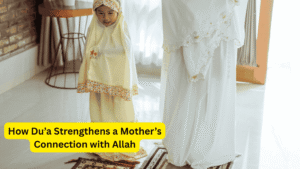Introduction
In a rapidly changing world, many Muslim children grow up struggling to balance faith with modern pressures. Questions of identity, belonging, and confidence often arise as they navigate schools, social media, and friendships. In this journey, the father’s role is pivotal.
Islam positions fathers as leaders of the household, responsible not only for providing materially but also for preserving iman (faith) and shaping identity. The Qur’an instructs:
“O you who believe! Save yourselves and your families from a Fire whose fuel is men and stones.” (Qur’an 66:6)
This responsibility begins at home. The way fathers live, pray, teach, and guide leaves an imprint on children’s hearts that lasts a lifetime. This blog explores how Muslim fathers can nurture both faith and identity in their homes, drawing from the example of the Prophet Muhammad (pbuh).
1. Fathers as Spiritual Leaders of the Home
The Prophet (pbuh) led his family in prayer, teaching them Qur’an, and reminding them of Allah. His presence as a spiritual guide strengthened both faith and family unity.
Practical Applications:
- Lead the family in at least one daily prayer at home.
- Establish a weekly Qur’an circle, reading short passages together.
- Encourage du’a after salah — let children make their own du’as out loud.
Why It Works: Children witness faith as a lived practice, not a lecture. The father’s consistency sets a rhythm that anchors the household in iman.
2. Identity Through Islamic Values
Children build their sense of identity by observing values around them. Fathers who demonstrate honesty, humility, and fairness pass on values that shape self-worth.
Prophetic Example: The Prophet (pbuh) emphasized truthfulness, mercy, and justice even in small matters. His grandchildren learned these values directly through his behavior.
Practical Applications:
- Keep promises, even when small.
- Speak truth, even if uncomfortable.
- Treat family members with fairness — avoid favoritism among children.
Why It Works: Children internalize Islamic values as part of who they are, strengthening both faith and self-identity.
3. Faith in Action — Leading by Example
Faith is not only rituals but actions. The Prophet (pbuh) involved his family in acts of worship and service, showing that Islam is a lifestyle.
Practical Applications:
- Take children to the masjid regularly.
- Involve them in acts of charity (helping the needy, giving zakat).
- Let them witness Ramadan practices (suhoor, iftar, taraweeh).
Why It Works: Children connect identity to faith in action, seeing Islam as part of everyday life rather than occasional rituals.
4. Strengthening Bonds Through Du’a
The Qur’an is filled with examples of prophets making du’a for their children:
- Ibrahim (as): “My Lord, make me an establisher of prayer, and [many] from my descendants.” (Qur’an 14:40)
- Zakariya (as): “Grant me from Yourself a good offspring; indeed, You are the Hearer of supplication.” (Qur’an 3:38)
Practical Applications:
- Make du’a by name for each child daily.
- Teach them short du’as for guidance, protection, and gratitude.
- Write a “Family Du’a List” and recite it together after salah.
Why It Works: Children feel spiritually supported and know their father prays for their success in dunya and akhirah.
5. Building Identity Through Culture and Language
Faith and identity are often linked to culture, language, and heritage. Fathers who connect children to their Islamic roots strengthen pride in who they are.
Practical Applications:
- Teach simple Arabic phrases connected to faith (salah terms, du’as).
- Celebrate Islamic occasions (Eid, Ramadan) with joy at home.
- Share stories of Muslim heroes and family ancestry.
Why It Works: Children grow up proud of their faith-based identity instead of feeling embarrassed or distant from it.
6. Modern Challenges Fathers Must Address
Secular Influences
Schools, peers, and media may weaken a child’s sense of Islamic identity. Fathers must create safe spaces for dialogue at home.
Tip: Ask open questions: “What did you learn today?” or “How would you respond to a friend who challenges your beliefs?”
Digital Distractions
Unfiltered internet use can shape identity more than family. Fathers must set boundaries and alternatives.
Tip: Introduce “tech-free family time” (during meals, after Maghrib).
Confidence in Being Muslim
Children sometimes feel different for practicing Islam. Fathers can instill confidence by sharing Prophetic stories of resilience and reminding them of the honor of faith.
7. Practical Fatherhood Tools for Faith and Identity
Daily Checklist for Fathers:
- Prayed with children today.
- Shared one Islamic story or value.
- Made du’a for each child by name.
- Corrected mistakes with dignity, not humiliation.
- Spent intentional time together (meal, activity, or Qur’an circle).
Conclusion
The role of fathers in nurturing faith and identity cannot be overstated. Muslim fathers are not only providers but also guardians of iman, teachers of values, and anchors of family stability. By following the prophetic model — leading spiritually, teaching through action, making du’a, and building cultural pride — fathers raise children who are both confident in their faith and strong in their identity.
In a world where faith and values are constantly tested, the father’s role remains a shield, guiding children toward Allah with love and wisdom.
Call to Action (CTA): Begin nurturing faith and identity today with our Family Leadership Notes — a printable tool at Halalings.com designed to help fathers lead with clarity, consistency, and mercy.





